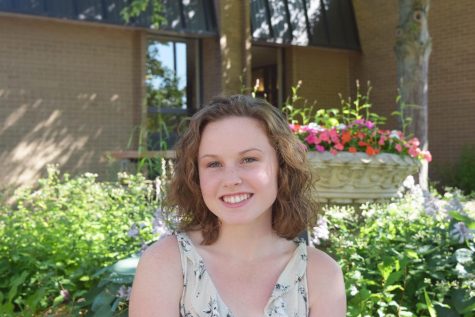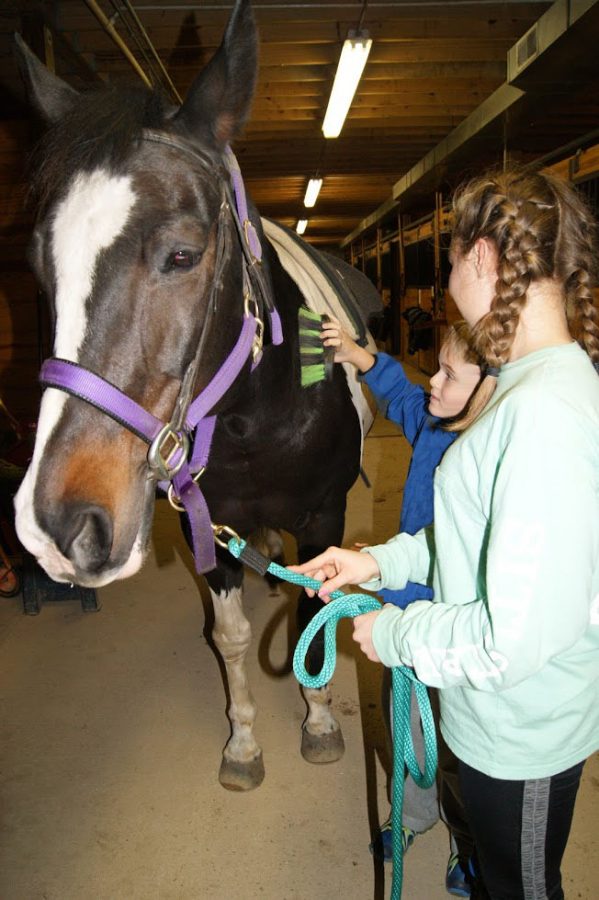Horses of Hope: challenging therapy that changes lives
Photo by Meggie Furlong
Lizzie Kalafut, freshman, helps a rider at Partners for Progress brush his horse. Kalafut started volunteering last winter because of her love for kids and horses.
Miracles on horses are happening every day, just a little over four miles from Lake Zurich High School.
Every year, Student Council chooses a local charity with a LZ connection to support for charity bash.
This years chosen charity, Partners for Progress, is a horse riding facility that therapeutically aids those with disabilities. The barn helps their riders gain functional ability, mental stability, emotional support, improved speech, or all of the above through the power of the horseback riding.
“The horse and the human body move at the same gait [the manner of walking]. It’s about 125 beats per minute. When the rider is on the horse and the horse begins to move, regardless of the rider’s challenge, the brain processes the movement that comes up from the horse into the human body as if the rider is walking,” Anne Margaret Huffman, Director of Community Relations at PFP, said.
Other than helping how the brain processes movement, the horse can also help strengthen the body to aid in walking, talking, digestion, breathing, and more through strengthening the core.
“The only way [the rider] can stay on the horse is to engage their core. Everything in your body comes from the strength of your core. There’s nothing that can challenge the human body the way that the horse can,” Huffman said. “It engages the brain, the core, and [while] you’re exercising the body, [you are] and asking them to have social interaction with the therapists, instructors, and volunteers too.”
Partners for Progress is not just a job for Huffman. It also has a personal attachment because of her daughter, Rhiannon, who has Autism, Hypotonia, and Sensory Integration Disfunction.
“She was diagnosed when she was three, and we didn’t know what to do,” Huffman said. When she was four and a half, I put her on a pony at Didier Farm and immediately noticed a difference. I live in unincorporated Antioch and we used to [drive by] horses a lot. Since she had regressive autism and lost all her words, she would have a quiet conversation with the horses. One of the few words she was able to retain was ‘stop,’ so if I moved before she was done, she told me she wasn’t done! And then we put her on that pony and immediately within five seconds there was a total change in her demeanor and her output and that’s when we knew that we had to look into this.”
At first Huffman was simply concerned with how she was going to pay for the therapy her daughter needed. Then PFP stepped in and only charged one-third of the actual cost for Rhiannon to ride there, as they do with all their riders.
“We have to fundraise the other two thirds, whether it’s through events or private donations,” Huffman said. “We run off of an estimated budget every year of about $750,000. We look at raising about half a million dollars a year in order to give these riders the therapy that they need to overcome their challenges.”
The money fundraised throughout the year through events such as charity bash will also help PFP purchase their rented facility, which includes a barn for their work horses, four pastures, one inside arena, two outdoor arenas, a family gathering area, a job skills room, and off horse therapy rooms.
However, the facility itself is not Partners for Progress’s primary financial concern.
“The biggest [cost] is our horses. Because of our clinical focus, all of our horses have to be sound, so that means we don’t take rescued horses or retired horses,” Huffman said. “We try to get our horses as young as possible with a little bit of training. In order to keep them clinically sound. [The horses] eat hay, grain, and supplements to keep them healthy and strong because they are giving over 20,000 hours a year of therapy, [and] the support of the Special Olympics team for their competitions and the competitions of the national traveling show team.”
To help care for these horses, volunteers put in about 480 hours a week to keep the facility running smoothly. These volunteers can be high school students, such as Lizzie Kalafut, freshman.
“Basically, you go there and check the board to see [which rider you are] with for the day, and if you’re leading or if you’re a sidewalker and helping the kids.” Kalafut said. “Then you tack up [or equip] your horse and walk them and you help the rider get on and you help hold them into place and help them with their exercises.”
With the help of volunteers like Kalafut, PFP has a 79% goal achievement success rate for their riders.
“Watching the progress of not only my own daughter, but the other children [has been most memorable for me]. Usually within 10 to 12 weeks, and sometimes with some kids you can see it within the first three rides, you can see a change in these children. It is nothing short of miraculous,” Huffman said. “There’s really no other way to describe how the therapies and the movement of the horses change these children and help them to overcome their challenges.”

As a senior, Meggie is the Web Editor-in-Chief of Bear Facts Student Media. Previously, she was the Social Media Manager in charge of the staff Twitter...

